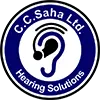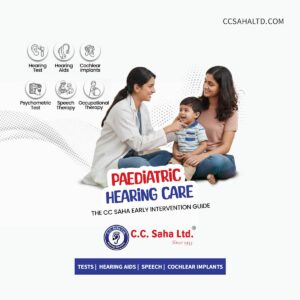
Paediatric Hearing Care
Early intervention is the key to paediatric hearing care. Learn how CC Saha Ltd. combines audiology, speech therapy, and occupational therapy for success.
The familiar glow of a screen in a darkened room has become a nightly ritual for many in Kolkata. After a long day at office, meetings, traffic, and chaos, what could be more relaxing than sinking into bed with your smartphone, tablet, or laptop to catch up on your favourite series? This habit, often called “bed binging,” modern way to decompress. What could be better, least being harmful, right?
But what if this seemingly innocent comfort is silently chipping away at one of your most precious senses? The stark reality is that the growing trend of bed binging is creating a direct pathway to irreversible medical problems, and a critical concern is the link between bed binging and ear damage.
For close to a century, CC Saha Ltd. has been a cornerstone of hearing healthcare in Kolkata. We’ve seen hearing health challenges evolve with time and technology. Today, we are witnessing a new, insidious threat that affects everyone, from teenagers to our elderlies. It’s a threat that whispers directly into your ear canal, night after night.
This deep dive will explore how your nightly streaming habit could be leading to significant hearing complications and what crucial lifestyle shifts you can make today to protect your auditory health.
Today, 1 in 5 teens will experience some form of hearing loss—a rate about 30% higher than it was 20 years ago. Many experts believe the escalation is due, in part, to increased use of headphones.
American Osteopathic Association
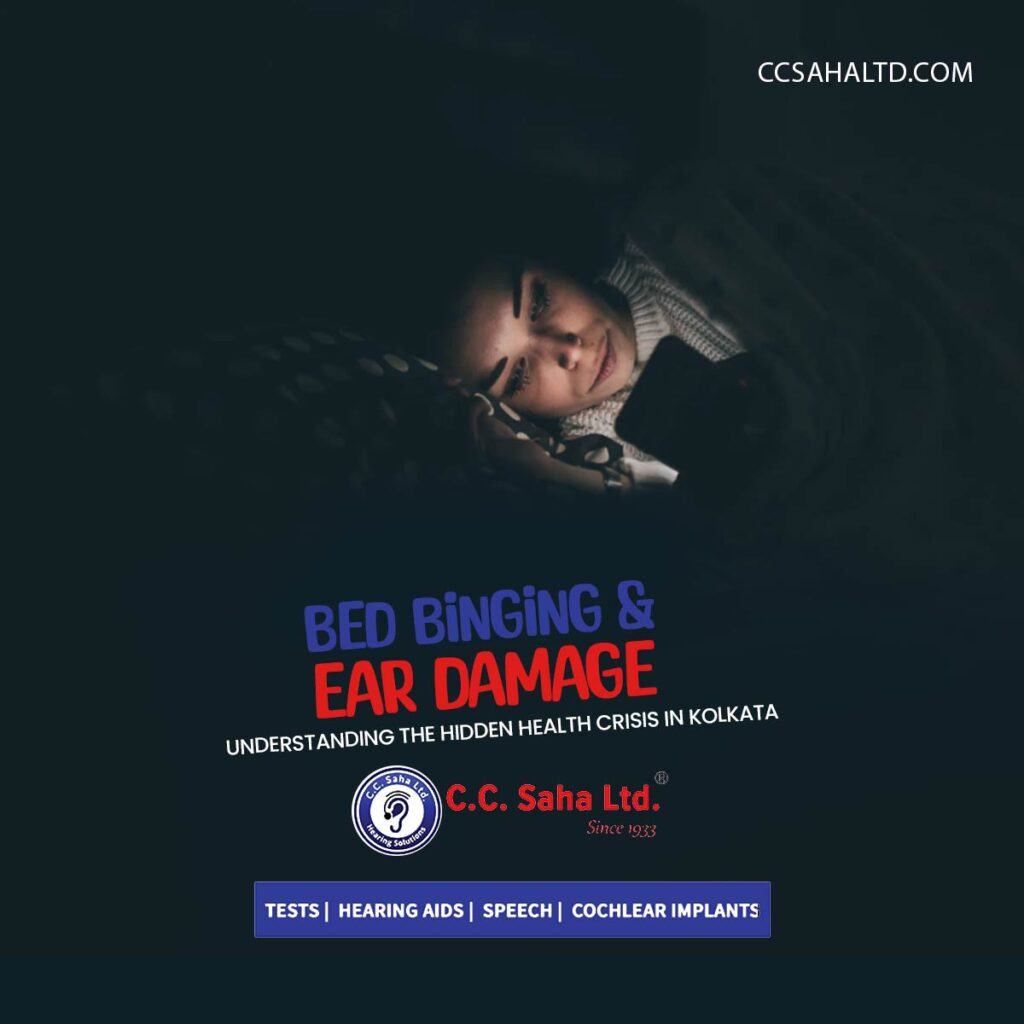
“Bed binging” isn’t just about watching a single episode before you sleep. It’s the practice of consuming hours of digital content—movies, web series, videos, reels and podcasts—while lying in bed, typically using personal listening devices like earphones or headphones.
It starts innocently. You keep telling yourself, “just one more.” But the immersive storylines, cliffhanger endings, add a little slack and above all your FOMO (fear of missing out) keep you hooked. Before you know it, midnight has turned into 3 AM, and you’ve spent hours with sound blasting directly into your ears. This prolonged, close-range exposure to sound in a quiet environment is the perfect storm for auditory distress, setting the stage for serious ear problems from binge watching in bed.
How can something as simple as watching a show in bed harm your ears? The damage happens through a combination of factors, each one compounding the other.
The most significant risk is Noise-Induced Hearing Loss (NIHL). Your inner ear contains tiny, delicate hair cells (stereocilia) that vibrate in response to sound waves and convert them into electrical signals that the brain interprets as sound.
Loud noises act like a relentless tsunami against these delicate cells. Exposure to excessively loud sounds can damage or destroy them. Once these hair cells are gone, they do not grow back. The damage is permanent.
The two key factors in NIHL are volume (intensity) and duration.
When you’re in a quiet bedroom, there’s no background noise to compete with. This often leads users to perceive the volume as lower than it actually is, causing them to turn it up to a level that is dangerously high for prolonged listening, accelerating the potential for bed binging and ear damage. Not to forget the exposure to high decibels in traffic and workplaces all day.
The type of listening device you use matters immensely. Earbuds and in-ear monitors are particularly problematic because they sit deep inside the ear canal. This creates a seal, delivering the sound pressure directly to the eardrum with no room to escape. This can increase the sound level by an additional 6 to 9 decibels—enough to significantly shorten the safe listening time.
Over-ear headphones are generally a safer bet, but no device is completely risk-free. The core issue remains the proximity of the sound source to the eardrum and the extended duration of the exposure, a key factor in the link between bed binging and ear damage.
Your posture in bed also plays a role. When you lie down, especially on one side, you can alter the blood flow throughout your body. Lying with your head propped up on a pillow can sometimes compress blood vessels in your neck, potentially reducing circulation to the delicate structures of the inner ear. For individuals already experiencing auditory issues, this compromised blood flow can worsen symptoms like tinnitus (a ringing or buzzing in the ears) and make the ears more susceptible to noise-induced damage.
This modern habit transcends age, but the risks are not the same for everyone.
Many elderlies in Kolkata and beyond are already managing age-related hearing loss (presbycusis). This condition makes the ears more vulnerable to further damage from loud noises. For an individual already using a hearing aid, bed binging with blue-tooth enabled hearing aids can feel like a private, immersive experience. However, the high volume required to overcome existing hearing loss can rapidly accelerate the decline of their remaining natural hearing. It’s a vicious cycle where the solution for better hearing (turning up the volume) becomes part of the problem. Preventing bed binging and ear damage is therefore doubly important for this demographic to preserve the hearing they have left.
Children’s and teenagers’ auditory systems are still developing, making them incredibly susceptible to NIHL. Their ear canals are smaller, which can increase the sound pressure level from earphones. Parents across Kolkata are rightly concerned about screen time, but the auditory aspect is often overlooked. Youngsters may listen at dangerously high volumes, unaware of the long-term consequences.
The hearing damage they sustain today from binge-watching might not become apparent until their 30s or 40s, leading to a lifetime of communication difficulties.
It’s a silent epidemic, and parents must be the first line of defence. Answering the question, “can watching shows hurt your ears?” with a firm “yes” is the first step in educating them.
Ear damage from noise exposure is often gradual. You might not notice it until it’s significant. Be vigilant for these warning signs in yourself or your loved ones:
If you experience any of these symptoms, it is a clear signal from your body to seek professional help immediately.
The goal isn’t to eliminate technology but to use it responsibly. Here are some actionable steps you can take to mitigate the risks:
Ignoring the early signs of hearing damage is a gamble with your quality of life. Hearing connects us to our world, our family, and our community. At CC Saha Ltd., we believe that proactive care is the best care. If you suspect the phenomenon of bed binging and ear damage has affected you or a loved one, the most crucial step is to get a professional hearing evaluation.
A baseline hearing test (audiogram) is a simple, painless procedure that provides a detailed snapshot of your hearing health. It can detect damage long before you might notice it yourself. This allows our expert audiologists to provide tailored advice and, if necessary, explore solutions ranging from custom ear protection to the most advanced hearing aid technology available in Kolkata. Our legacy is built on trust and a deep understanding of the hearing needs of the people of this city.
The nightly escape into the world of stories doesn’t have to come at the cost of your hearing. By understanding the risks and making conscious, healthy choices, you can enjoy your entertainment and preserve your auditory senses for a lifetime.
Don’t let bed binging and ear damage become your reality. Be proactive about your hearing health. If you have any concerns, however small, we invite you to connect with us.
Are you or a family member experiencing symptoms of hearing loss?
Don’t wait. Schedule a comprehensive hearing consultation with our expert audiologists at CC Saha Ltd. today.
Visit one of our clinics across Kolkata or call us to book your appointment.
Let us help you hear the world in all its richness and clarity.
Q1. Can binge-watching for just one night damage my ears?
While prolonged exposure over time causes the most significant damage, a single session of listening at very high volumes (e.g., max volume for over an hour) can certainly cause temporary hearing loss, tinnitus, and contribute to permanent damage to the delicate hair cells in your inner ear.
Q2. Is there a “safe” volume for using headphones in bed?
A generally recommended guideline is the 60/60 rule: listen at no more than 60% of your device’s maximum volume for no more than 60 minutes at a time. It’s also wise to enable the volume limiter feature on your smartphone.
Q3. Is the ear damage from bed binging reversible?
Unfortunately, Noise-Induced Hearing Loss (NIHL) from damaged inner ear hair cells is permanent. The cells do not regenerate. This is why prevention is absolutely critical. While the hearing loss itself cannot be reversed, professionals at CC Saha Ltd. can provide solutions like hearing aids to manage the condition effectively.
Q4. Are over-ear headphones safer than in-ear earphones?
Generally, yes. Over-ear headphones sit on the outside of your ear, allowing some sound to dissipate. In-ear earphones create a seal that directs all sound pressure straight to the eardrum, potentially increasing the decibel level. However, any listening device used at high volumes for long durations is risky.
Q5. What is tinnitus, and will it go away?
Tinnitus is the perception of sound (like ringing, buzzing, or hissing) with no external source. It’s a common early symptom of ear damage. While it can be temporary in some cases, for many, it becomes a chronic condition. Managing volume levels can prevent it from starting or worsening.
Q6. My child says they can’t hear their videos unless the volume is high. Should I be concerned?
Yes, this is a major red flag. It could indicate that some hearing loss has already occurred, forcing them to increase the volume, which in turn causes more damage. An immediate professional hearing evaluation is strongly recommended.
Q7. I already wear a hearing aid. Am I still at risk?
Yes. It’s crucial to protect your remaining natural hearing (residual hearing). Using headphones at a loud volume can accelerate the decline of your natural auditory function. Consult your audiologist at CC Saha Ltd. for advice on safe listening practices.
Q8. How does lying on my side affect my hearing?
Lying on one side can put physical pressure on the ear and potentially alter blood circulation to the inner ear. While this alone may not cause hearing loss, it can exacerbate existing conditions like tinnitus and make the ear more vulnerable to noise damage.
Q9. What happens during a hearing check-up at CC Saha Ltd.?
A hearing check-up is a simple and painless process. Our audiologist will first discuss your health history and any concerns you have. Then, you’ll sit in a sound-treated room and listen to a series of tones at different pitches and volumes through headphones. This helps us create an audiogram, which is a detailed map of your hearing ability.
Q10. How often should I get my hearing tested?
If you don’t have any symptoms, it’s good practice for adults to get a baseline test and then follow up every few years. However, if you are frequently exposed to loud noise (including through headphones), are over 60, or notice any changes in your hearing, you should get tested annually.
Q11. Can I just use speakers instead of headphones? Is that completely safe?
Using speakers is significantly safer because the sound disperses in the open air, and its intensity drops dramatically before it reaches your ear. However, if you play speakers extremely loudly in a small, enclosed room for hours, the risk of damage, though lower, still exists.
Q12. What are the earliest signs of bed binging and ear damage?
The very first signs are often subtle. They include temporary ringing in the ears (tinnitus) after listening, sounds seeming slightly muffled, or finding it a bit harder to hear conversations in noisy environments like a Kolkata market.
Q13. Are noise-cancelling headphones a good solution?
They can be a very good tool. By blocking out background noise, they allow you to listen comfortably at a much lower, safer volume. However, they do not make loud music safe. If you still turn the volume up high, the risk of damage is the same.
Q14. Why is this problem more serious for kids and teens?
Their auditory systems are still developing and are more fragile. Furthermore, hearing damage is cumulative. Damage sustained in their youth will compound over their lifetime, potentially leading to significant hearing loss and communication challenges much earlier in life than previous generations.
Q15. Why should I choose CC Saha Ltd. for my hearing health in Kolkata?
With a legacy of over 100 years, CC Saha Ltd. combines generations of trust with the latest in audiological technology. Our team is dedicated to the specific needs of the Kolkata community, offering personalised care, accurate diagnostics, and a complete range of solutions from prevention to advanced hearing aids.
At CC Saha Clinics, we specialize in maintaining and servicing all types of hearing aids, from basic models to the latest Bluetooth-enabled and rechargeable devices. With locations across Kolkata—Esplanade, Prince Anwar Shah Road, Salt Lake, Dunlop, and Barasat—as well as in Burdwan and Paschim Midnapore, we are Eastern India’s most trusted hearing care provider.
Protect your ears from Kolkata’s relentless noise pollution. Visit CC Saha Ltd. for a comprehensive hearing check-up and explore cutting-edge solutions at the Brilliant Sound Galaxy. Let’s ensure your hearing stays as vibrant as the city you love.

Early intervention is the key to paediatric hearing care. Learn how CC Saha Ltd. combines audiology, speech therapy, and occupational therapy for success.
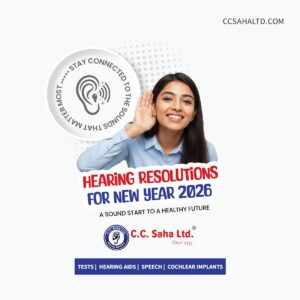
As we welcome 2026, it is time to prioritize ear health. Explore our guide on making impactful hearing resolutions for the New Year, from annual testing to upgrading your devices.

At CC Saha Ltd., excellence in hearing care meets a legacy of compassion and expertise. As the best hearing aid centre in Kolkata since 1933, the brand continues to make hearing comfortable, easy, and life-changing for every generation.

CC Saha Ltd delivers the best cochlear implants in Kolkata and Eastern India, specializing in various types and guiding patients through every stage of the cochlear implant journey.
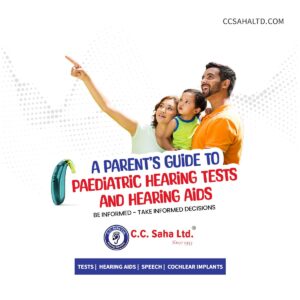
Early detection of hearing loss can define a child’s ability to communicate, learn, and connect with the world. Paediatric hearing tests are designed to identify hearing challenges at the earliest stages, often before a parent even notices a concern. From new-born OAE and ABR screenings to playful conditioned audiometry in toddlers, these specialized tests ensure accurate results in a child-friendly way.
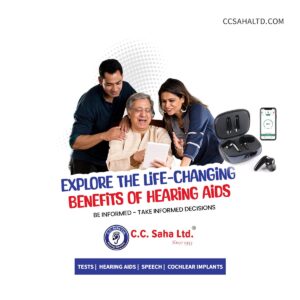
The benefits of hearing aids go far beyond better hearing—they transform lives by improving communication, emotional health, and cognitive vitality. From reconnecting with loved ones to regaining confidence in social and professional settings, hearing aids restore the joy of sound in every moment. With advanced technology that adapts to individual environments, they offer clarity, comfort, and control. Discover how embracing modern hearing solutions through CC Saha Ltd. can help you experience the life-changing benefits of hearing aids today.
